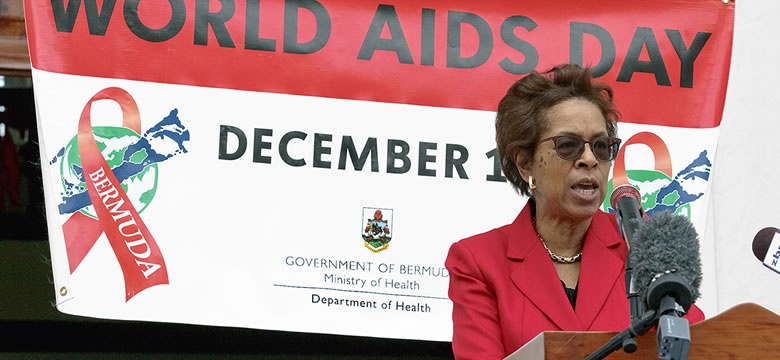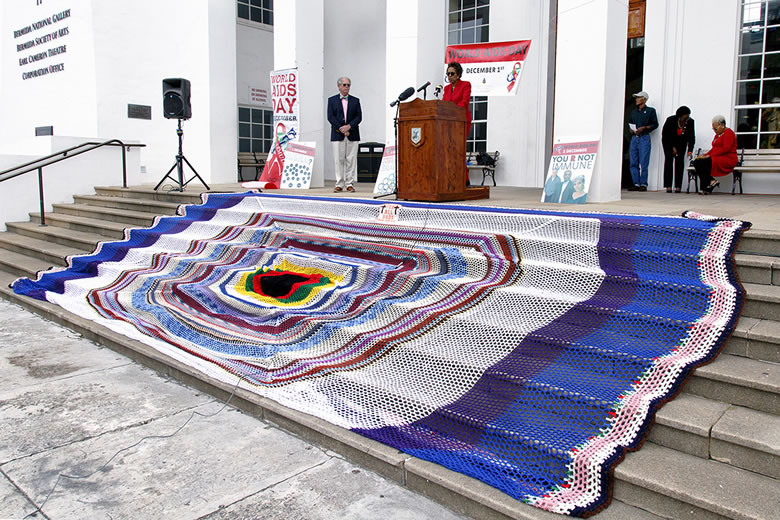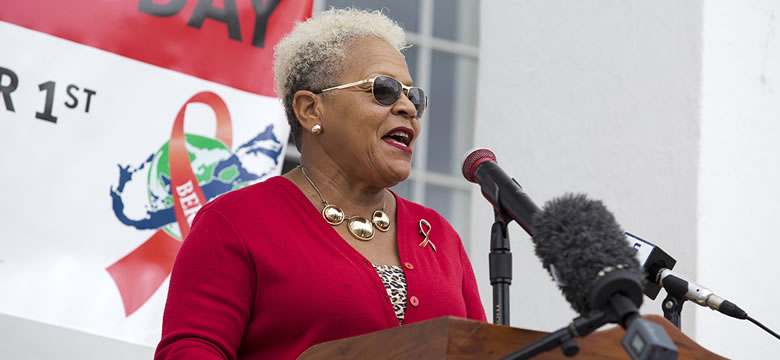Minister's Remarks - World AIDS Day 2016

Ministerial remarks by the Minister of Health and Seniors, the Hon. Jeanne Atherden CA, CPA, JP, MP
World AIDs Day at City Hall
December 1, 2016 at noon
Good afternoon,
World AIDS Day is held on December 1st each year. It is the day that the whole world takes notice of HIV and AIDS. It’s a time to take stock, a time to remember those who have gone and to celebrate those who are living well with HIV.
This year, the United Nations’ theme is “Take the Challenge: end AIDS.” According to UNAIDS, in 2015 there were over 36 million people living with HIV. Several decades ago, when transmission levels were high, the goal of getting to zero new infections, zero discrimination, zero AIDS‐related deaths seemed impossible. But look at the progress we have made. This is a day to reflect on how far we have come.
For example, in Bermuda, there have not been any mother‐to‐child transmissions of HIV in Bermuda for almost two decades. There have also been drastic declines in the number of cases reported as being transmitted through injection drug use. Indeed, fewer than 10 new HIV infections have been reported each year from 2011-2015, with all reporting sexual contact as the mode of transmission.
So, I must say this: do not be complacent about your sexual health. Caribbean Public Health Agency Statistics show that eighty-three percent of reported persons with HIV in the Caribbean are in the 15-54 year age group, with 50 percent of that group being 25-34 years old. CARPHA’s Executive Director said “this means the HIV/AIDS epidemic has been moving steadily into younger and younger population groups.”
Currently, there are over 300 people living with HIV in Bermuda. Most, just over 68%, are between the ages of 25-44, three-quarters are male, and 9 out of 10 are Bermudian.
The Centers for Disease Control and Prevention (CDC) and the World Health Organization (WHO) have recommended that everyone between the ages of 13 and 64 get tested for HIV at least once as part of routine health care. Persons likely to be at increased risk of HIV should get tested more often, at least annually, depending on their level of risk. These include persons who have had more than one sexual partner since their last HIV test, persons who have been diagnosed or sought treatment for another sexually transmitted infection, and persons who have sex with a partner with an unknown HIV status.
Knowing one’s HIV status, and early diagnosis, is important for maintaining health and reducing the spread of the virus. Given the preventable nature of HIV and advances in HIV/AIDS care, the Ministry believes that a generation free of HIV is possible. I encourage everyone to get tested. You can ask your doctor to test you for HIV or go to the Communicable Disease Control Clinic at the Hamilton Health Centre. Testing at the Communicable Disease Control Clinic is confidential and free of charge.
Protecting yourself and others against HIV starts with knowledge.
Knowing the facts about HIV will help you make informed decisions about sex, drug use, and other activities that may put you and your partners at risk for HIV.
I encourage the public to learn the basics about HIV, how to prevent HIV transmission, and the steps you can take to protect yourself and others. Talk about what you learn with your friends and other people who are important to you.
I want to take a moment to talk about those who support people who get a positive diagnosis. The charity Supportive Therapy for persons with AIDS and their Relatives (S.T.A.R.) has been instrumental in providing education, counseling, housing and support for Bermudian families that have been affected by HIV/AIDS.
As we press toward our goal of an HIV free generation in Bermuda, I encourage our community to rally together to continue the progress made by HIV/AIDS awareness and prevention initiatives. I would also like to acknowledge our Communicable Disease Control team, public health nurses and nurse epidemiologist, who provide care and health counseling to persons living with HIV/AIDS.
In summary, here’s what will help end AIDS. Have open and honest conversations about sexual health. Share your knowledge of HIV or your personal HIV story with others. Support people living with HIV. Wear a red ribbon to show your support. Listen to the challenges that people living with HIV face and provide support for their needs.
Bermuda, let’s take the challenge to end AIDS.
Thank you.

Minister of Health and Seniors, the Hon. Jeanne Atherden, CA, CPA, JP, MP delivered remarks at City Hall to recognise this global event, along with the Mayor of Hamilton Charles Gosling and Dr. Carol Armstrong of the charity S.T.A.R..
